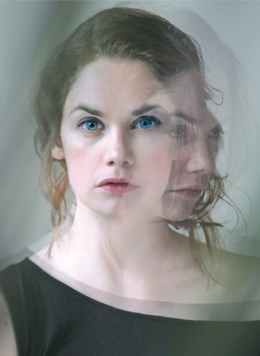Through a Glass Darkly
The family are on holiday in their house on an island in the Swedish archipelago. The sky and sea are grey, the house basic, the paint stripped, the wood bleached by the salt air, the family exposed and vulnerable. Karin has been ill in hospital with schizophrenia. Her husband Martin, who is a doctor and older than her, has written to her father David, telling him that Karin is more seriously ill than was thought and there is a risk her illness will become chronic. The family trauma is set on repeat; Karin’s mother grew mad and died when she and her brother Max were growing up. Karin, 24 and recently married, struggles to keep it all together while Max, just 16, is touchy and insecure. They both desperately need their father to be a solid figure they can forge their identity from, but David is distant; he hides behind the persona of the famous novelist he can never be. He was too selfish, analytical and defended, to help his wife find meaning and reality. Fate has given him a second chance at redemption, but he writes in his diary that Karin’s illness has created the opportunity to write his definitive novel about a personality in decline.
So, Karin doesn’t stand a chance. If madness and meaning are defined according to cultural norms, whatever they are, Karin holds on what is generally accepted as reality is tenuous. She was never properly encultured by her parents; her mother was already in a different reality and her father had shut himself away in his own world. Even her husband, Martin seems all too keen to turn her into a patient; he is so grounded in the autism of medicine that Karin cannot access him. Only Max seems to understand but Max is more part of the wreckage than would be rescuer.
‘ What if you looked in a mirror and there was no one there?’
There is a nothing more frightening as not to have any meaning in your life. Karin is confused, terrified, she cannot sleep and she doesn’t really know what is real any more. She has the acute sensitivity of the neurotic; she can detect bullshit at 100 paces. The words Martin uses seem to make sense but she doesn’t believe them. He is more dangerous than the elusive father. We can see only too clearly why she is mad, but at the same time can understand why the system does not want so much to cure her with understanding as to lock her up. Unable to gain a foothold on meaning from those around her, Karin has to get her reality from elsewhere; from the birds, from her voices, from God. And because her reality is different, it is deemed dangerous; she is declared mad and has to be subdued and separated, lest she contaminate others.
But there is hope. The maverick sixties psychiatrist, RD Laing, author of The Divided Self, once wrote ‘Madness need not be a breakdown; it can be a breakthrough’. It was Laing who stood out against the biological drift of psychiatry by explaining the process of going mad as the rational consequence of a person’s family and social environment. He argued that there may be positive value in allowing a person’s psychosis to develop. He could then engage with the patient’s psychotic world and lead them into a reality more attuned to their societal norms, give them something to hold on to.
‘I would wish to emphasise that our normal adjusted state is too often the abdication of ecstasy, the betrayal of our true potentialities that many of us are only too successful in acquiring a false self to adapt to our false realities.’ (Preface to The Divided Self by RD Laing)
‘Through a Glass Darkly’ was written and directed as a film by Ingmar Bergman in 1961. Now Jenny Worton has adapted it as a play, which was premiered at the Almeida this June to mixed reviews. But this is not a play that entertains, it has a disturbingly powerful message that merits much deeper reflection. The cast are superb. Michael Attenborough’s direction is sensitive and entirely credible. But it was the performance of Ruth Wilson as Karin that blew me away. How could such a young and seemingly fragile actress turn in such a major performance of such a difficult role. I watched with mounting horror as Karin slowly descended into madness and felt despair. Such is the power of great theatre.



